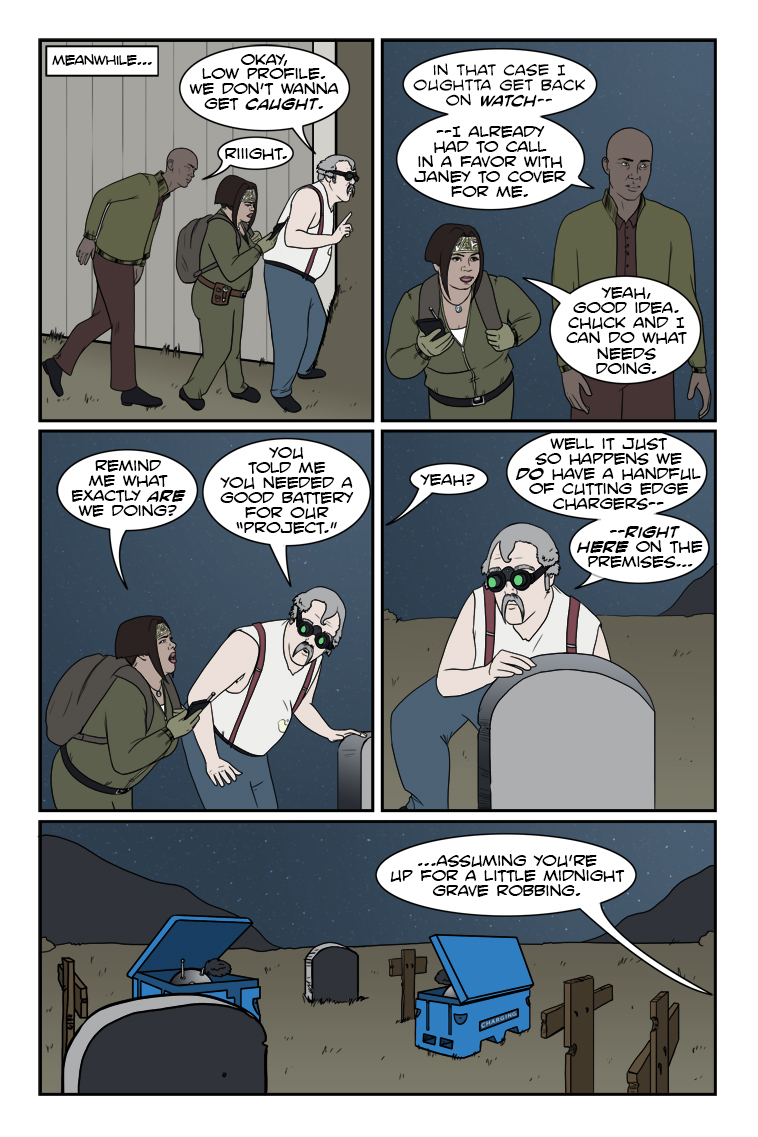Cart
Product categories
Support Us!
If you like what I do please support us on Ko-fi or Patreon.
Follow Us!
Join Our Newsletter!
Vote For Us!
Login
Polls
Events
-
Pasadena Comic Con
Dates: May 24
Location: Pasadena Convention Center, 300 E Green St, Pasadena, CA 91101, USA ( MAP)Details:We will be at the Pasadena Comic Con on January 26th. See some of you there for this one day event!
Purchase tickets online at here: https://www.tixr.com/groups/pcc/events/pasadenacomiccon-pasadena-comic-con-2025-115248
-
San Diego Comic Con: SP-N7
Dates: Jul 23 - 27
Location: San Diego Convention Center, 111 Harbor Dr, San Diego, CA 92101, USA ( MAP)Details:Clint & Dawn Wolf will be at San Diego Comic Con, as Lab Reject Studios. We will be at booth N7 in Small Press.









6 thoughts on “541 – Graverobbers”
Crazyman
“Oh, *that* kind of grave robbing? Lead on, Chuck!” 😈
Dr. Norman (not a real doctor)
What? I say “What”?
Keith
Heh, this is going to be fun. Tradition says you need to drink at least one bottle of MD 20/20 before going to the graveyard.
Honzinator
At first I was thinking of something like a potato battery … nope!
Scarsdale
If you take a dead “D” cell battery, take out the carbon rod from the center, cut a strip of galvanized sheet metal about an inch (2.7 centimeters), take a small jar for canning, suspend the rod in the center and the strip on the side, pour in drain cleaner, you’ll get 1.2 to 1.4 volts DC. 10 of those connected to an inverter will give you 120 VAC at 0.5 amps. Do NOT keep them in the same area you live in however, the fumes will burn your lungs. Just something I learned in chem class in high school. You’d have to top-up the jars every few days, however. Any type of acid will work, even salt water. I think the teacher was a survivalist…
nbaldbiz
Scheffler, Hovland and Conners Share the Lead at P.G.A. Championship
Jordan Spieth, who needs a victory at Oak Hill to complete the career Grand Slam, and Justin Thomas, who won last year’s tournament, just made the cut at five over.
Give this article
Latest Comics
#263. 252 – Smooth Coating
13 May 13, 2015
#262. 251 – How Green Was My Alley
12 May 06, 2015
#261. 250 – Best Practices
14 Apr 29, 2015
#260. 249 – Basic Instincts
47 Apr 22, 2015
#259. 248 – Nothing To Rapport
46 Apr 15, 2015
#258. EPISODE ELEVEN
49 Apr 13, 2015
#257. 247 – Person Of Interest (END OF EPISODE 10)
44 Mar 18, 2015
#256. 246 – Constructive Criticism
41 Mar 11, 2015
#255. 245 – Neither Borrower Nor Lender Be
13 Mar 04, 2015
#254. 244 – Adverse Witness
13 Feb 25, 2015
#253. 243 – Routine Inspection
15 Feb 11, 2015
#252. 242 – Work On, My Medicine
19 Feb 04, 2015
#251. 241 – Heinlein’s Razor
24 Jan 28, 2015
#250. 240 – Exhaustive Detail
16 Jan 21, 2015
#249. 239 – Expert Testimonial
14 Jan 14, 2015
#248. 238 – Scents And Sensibility
16 Jan 07, 2015
#247. 237 – Practical Withdrawal
17 Dec 24, 2014
#246. 236 – Quiet Riot
16 Dec 17, 2014
#245. 235 – Attention Horde
19 Dec 10, 2014
#244. 234 – Trouble Standard
15 Dec 03, 2014
Latest Chapters
Episode 22
Episode 21
Episode 20
Episode 19
Episode 18
Episode 17
541 – Graverobbers
WonderCon 2025 is coming soon, so the next comic is planned for April 9th.
In the meantime, relevant previousness for this week's page:
https://www.zombieranchcomic.com/comic/223-surrounded-by-film-end-of-episode-9/
https://www.zombieranchcomic.com/comic/483-solar-systems/
Bedbugs to burninations…
Calendar
BlueSky Latest Posts
Writer’s Blog Archives